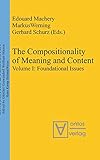The Compositionality of Meaning and Content. Volume I, Foundational Issues / ed. by Markus Werning, Edouard Machery, Gerhard Schurz.
Material type: TextSeries: Linguistics & Philosophy ; 1Publisher: Berlin ; Boston : De Gruyter, [2013]Copyright date: ©2005Description: 1 online resource (308 p.)Content type:
TextSeries: Linguistics & Philosophy ; 1Publisher: Berlin ; Boston : De Gruyter, [2013]Copyright date: ©2005Description: 1 online resource (308 p.)Content type: - 9783110323061
- 9783110323627
- 410
- P125
- online - DeGruyter
- Issued also in print.
| Item type | Current library | Call number | URL | Status | Notes | Barcode | |
|---|---|---|---|---|---|---|---|
 eBook
eBook
|
Biblioteca "Angelicum" Pont. Univ. S.Tommaso d'Aquino Nuvola online | online - DeGruyter (Browse shelf(Opens below)) | Online access | Not for loan (Accesso limitato) | Accesso per gli utenti autorizzati / Access for authorized users | (dgr)9783110323627 |
Frontmatter -- Contents -- Preface -- Is Compositionality an A Priori Principle? -- Fodor’s Inexplicitness Argument -- Compositionality Inductively, Co-inductively and Contextually -- Confirmation and Compositionality -- Levels of Perceptual Content and Visual Images. Conceptual, Compositional, or Not? -- Recognitional Concepts and Conceptual Combination -- How Similarities Compose -- The Structure of Thoughts -- Intensional Epistemic Wholes: A Study in the Ontology of Collectivity -- Impossible Primitives -- Is Compositionality an Empirical Matter? -- The Compositionality of Concepts and Peirce’s Pragmatic Logic -- Semantic Holism and (Non-)Compositionality in Scientific Theories -- Right and Wrong Reasons for Compositionality
restricted access online access with authorization star
http://purl.org/coar/access_right/c_16ec
Representational systems such as language, mind and perhaps even the brain exhibit a structure that is often assumed to be compositional. That is, the semantic value of a complex representation is determined by the semantic value of their parts and the way they are put together. Dating back to the late 19th century, the principle of compositionality has regained wide attention recently. Since the principle has been dealt with very differently across disciplines, the aim of the two volumes is to bring together the diverging approaches. They assemble a collection of original papers that cover the topic of compositionality from virtually all perspectives of interest in the contemporary debate. The well-chosen international list of authors includes psychologists, neuroscientists, computer scientists, linguists, and philosophers.
Issued also in print.
Mode of access: Internet via World Wide Web.
In English.
Description based on online resource; title from PDF title page (publisher's Web site, viewed 28. Feb 2023)


